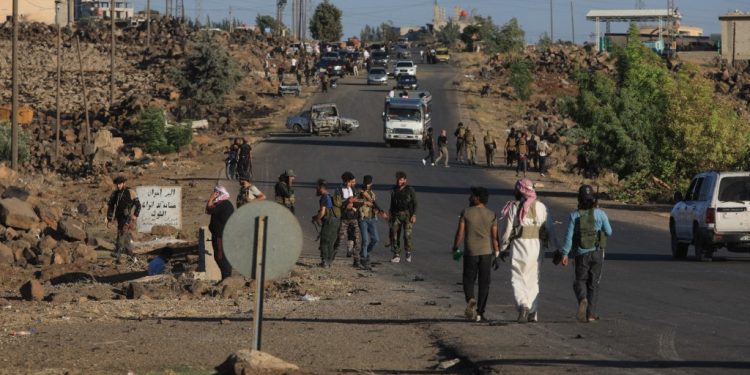Between July 13 and the date of this report’s release, a leading Syrian rights group has verified the deaths of at least 814 individuals in Suweida province amid ongoing unrest. Among the victims are 34 women—including one who suffered a fatal heart attack upon learning of her grandson’s death—20 children, 6 medical workers (3 of them women), and 2 media professionals. In addition, more than 903 people have been injured with varying degrees of severity. These figures are based on preliminary information and remain subject to revision as further data becomes available.
Escalation and Unlawful Killings
The Syrian Network for Human Rights (SNHR) said in a report on Thursday that the surge in violence includes unlawful killings, intensifying clashes, mutual shelling, and Israeli airstrikes, all of which have compounded the humanitarian toll. The initial death toll encompasses civilians—including children and women—medical and media personnel, armed Bedouin tribal fighters, local factions operating beyond state control, and members of the Syrian internal security forces and the Ministry of Defense.
The SNHR stressed that these numbers are preliminary and under continuous revision. Verification efforts are ongoing to further classify victims by affiliation and civilian or combatant status.
Exclusion of Armed Groups from Victim Count
According to its established methodology rooted in international human rights law, the SNHR does not document the deaths of armed combatants from groups operating outside state control if they were killed during combat, as such cases do not constitute violations of human rights. However, any person killed after being detained is considered a victim of extrajudicial execution and is documented as such.
The SNHR reaffirmed its commitment to closely monitoring developments in Suweida, investigating incidents, and collecting testimonies and available evidence to ensure accurate identification of victims and accountability for perpetrators.
Recommendations to the Syrian Government
The SNHR issued a comprehensive list of recommendations directed at the Syian government:
- Regulate the use of force in accordance with international legal standards; avoid indiscriminate or excessive use of weapons in populated areas due to the grave risk to civilian lives and community stability.
- Ensure immediate and unhindered access for humanitarian aid to affected areas; establish safe corridors for relief teams and provide medical and psychological support to the injured, especially women and children.
- Conduct transparent, independent investigations into all reported violations—including extrajudicial killings, abductions, arbitrary detentions, and degrading treatment—aimed at holding perpetrators accountable and restoring public trust in justice institutions.
- Protect vital civilian infrastructure—such as schools, hospitals, and places of worship—from attack or militarisation, and fully exclude them from the theatre of conflict.
- Respect international human rights obligations, reaffirming the state’s legal responsibilities under international law.
- Support local and communal mechanisms for conflict resolution, by fostering civil dialogue initiatives and involving respected community and religious leaders in de-escalation efforts.
- Curb incitement and sectarian rhetoric in media and online platforms, and promote messages of national unity and civil peace through regulatory and awareness campaigns.
- Ensure transparency and accountability in official security operations, including advance public notification of curfews or security sweeps, and provide accessible grievance mechanisms.
- Encourage local and national media to uphold responsible, balanced reporting that documents facts without inflaming tensions, and to promote a culture of human rights and reconciliation.
- Provide comprehensive support to victims and their families, including psychological and social services, fair compensation, official recognition of their suffering, and inclusion in transitional justice and national reconciliation frameworks.
- Launch human rights education and awareness programs, especially in conflict-affected regions, focusing on values of tolerance, diversity, and citizenship in partnership with civil society and grassroots initiatives.
- Utilise national and international expertise in crisis management, and develop rapid-response mechanisms to local conflicts based on prevention, mediation, and community participation—steering clear of purely military solutions.
- Reassess the centrally managed political transition, with a view to expanding inclusive, pluralistic participation across state institutions.
Recommendations to Other Actors in the Suweida Conflict
The SNHR also called on all other parties involved in the Suweida conflict to:
- Fully adhere to international human rights standards, refraining from any acts of reprisal or attacks on civilians and civilian infrastructure.
- Cease hostilities immediately, halt incitement to violence, and commit to a comprehensive ceasefire based on restraint and dialogue as the primary means of resolving disputes.
- Cooperate with civil and official efforts aimed at de-escalation and ceasefire implementation, and facilitate humanitarian and medical access to affected areas.
- Avoid retaliatory or inflammatory actions, maintain neutrality toward civilians, and refrain from behaviour that could deepen societal divides.
- Respect the role of local leaders and religious figures in mediation initiatives, and avoid actions that might obstruct reconciliation and community dialogue.
- Refrain from disseminating or promoting sectarian or inciting rhetoric across media or social platforms, in support of efforts to calm tensions and prevent further escalation.
This article was translated and edited by The Syrian Observer. The Syrian Observer has not verified the content of this story. Responsibility for the information and views set out in this article lies entirely with the author.


